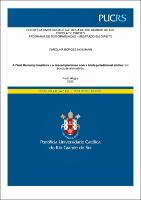| Share record |


|
Please use this identifier to cite or link to this item:
https://tede2.pucrs.br/tede2/handle/tede/10281| Document type: | Dissertação |
| Title: | A fluid recovery brasileira e o descompromisso com a tutela jurisdicional efetiva : em busca de alternativas |
| Author: | Mosmann, Carolina Borges  |
| Advisor: | Jobim, Marco Felix |
| First advisor-co: | Osna, Gustavo |
| Abstract (native): | No que tange à tutela executiva de direitos difusos e coletivos stricto sensu, a regra é a reparação integral in natura. Isso pois, em se tratando de direitos transindividuais, dotados de indivisibilidade e indisponibilidade, sua eventual lesão não permite valoração econômica prima facie. Em contrapartida, em se tratando de direitos individuais homogêneos, a regra é a reparação do dano em pecúnia, haja vista que, conforme comando impresso no art. 95 do Código de Defesa do Consumidor (CDC), as sentenças procedentes prolatadas nestas ações devem ser genéricas. Assim, incumbe à vítima, seus sucessores ou demais legitimados em lei, promover a execução da sentença genérica, pela via do cumprimento de sentença. Ocorre que, seja por dificuldade de acesso ao judiciário, seja por desconhecimento do direito reconhecido em decisão judicial, o número de interessados habilitados para promoção da execução não raramente era ínfimo quando comparado à gravidade do dano cometido pelo réu coletivo. Assim, como uma válvula de escape às falhas inerentes a execução individual destas sentenças coletivas genéricas, o legislador pátrio passou a autorizar uma nova modalidade de execução dos direitos individuais homogêneos. Trata-se de execução residual, prevista no art. 100 do CDC, segundo o qual “decorrido o prazo de um ano sem habilitação de interessados em número compatível com a gravidade do dano, poderão os legitimados do art. 82 promover a liquidação e execução da indenização devida”. O presente trabalho se propôs, nesse norte, à análise crítica do funcionamento do instituto, tomando por base a necessidade de se conceder ao jurisdicionado a tutela efetiva de seus direitos, finalidade essa precípua da jurisdição do Estado Constitucional. Verificou-se, pela literatura estudada e pelos dados empíricos obtidos que a técnica posta no art. 100 do CDC, em verdade, tem pouca ou nenhuma semelhança à fluid recovery norte-americana, bem como é inadequada – quando analisada à luz da função precípua da jurisdição contemporânea – e inefetiva – quando considerados os resultados “reparadores” obtidos em prol dos direitos individuais homogêneos lesados. Diante de tais dados, foram anunciadas alternativas ao problema com amparo na legislação processual vigente e no direito comparado. |
| Abstract (english): | Regarding the enforcement of diffuse and collective rights, stricto sensu, the rule is full reparation in natura. That is because, in case of transindividual rights, as they are provided with indivisibility and unavailability, their eventual injury does not allow a prima facie economic valuation. On the other hand, when it comes to homogeneous individual rights, the rule is the pecuniary repair of the damage, considering that, according to the command under the Article 95 of the Consumer Defense Code, the judgement made in these lawsuits must be generic. Thus, it is duty of the victim, his/her successors or other lawful parties to promote the enforcement of the generic judgement. It occurs that, due to either the difficulty in accessing the judiciary or the lack of knowledge of the right recognized in a judicial decision, the number of interested parties qualified to promote the execution was frequently minimal when compared to the severity of the damage committed by the collective defendant. Thus, in order to avoid the inherent flaws in the individual enforcement of these generic collective sentences, the Brazilian legislator started authorizing a new type of enforcement of homogeneous individual rights. It is a residuary execution, located in the Article 100 of the Consumer Defense Code, according to which "after the period of one year has elapsed without the qualification of interested parties in a number compatible with the seriousness of the damage, the lawful parties of Article 82 may promote the liquidation and execution of the due indemnity. The present work proposed, in this sense, a critical analysis of how the institute works, aiming at the need to grant the effective protection of the rights of the party under jurisdiction, the main purpose of the jurisdiction of the Rule of Law. It has been observed, through the literature studied and empirical data gathered, that the technique in the Article 100 of the Consumer Defense Code has little or no similarity to the American fluid recovery as well as being inappropriate - when analyzed considering the primary function of contemporary jurisdiction - and ineffective - when considering the "reparatory" results obtained on behalf of aggrieved homogeneous individual rights. In view of such data, alternatives to the problem were brought forward based on the procedural legislation in force and on comparative law. |
| Keywords: | Ações Coletivas Fluid Recovery Direitos Individuais Homogêneos Execução Coletiva Homogeneous Individual Rights Class Actions Fluid Recovery Collective Enforcement |
| CNPQ Knowledge Areas: | CIENCIAS SOCIAIS APLICADAS::DIREITO |
| Language: | por |
| Country: | Brasil |
| Publisher: | Pontifícia Universidade Católica do Rio Grande do Sul |
| Institution Acronym: | PUCRS |
| Department: | Escola de Direito |
| Program: | Programa de Pós-Graduação em Direito |
| Access type: | Acesso Aberto |
| Fulltext access restriction: | Trabalho será publicado como artigo ou livro |
| Time to release fulltext: | 12 meses |
| Date to release fulltext: | 03/06/2023 |
| URI: | https://tede2.pucrs.br/tede2/handle/tede/10281 |
| Issue Date: | 23-Feb-2022 |
| Appears in Collections: | Programa de Pós-Graduação em Direito |
Files in This Item:
| File | Description | Size | Format | |
|---|---|---|---|---|
| DIS_CAROLINA_BORGES_MOSMANN_COMPLETO.pdf | CAROLINA_BORGES_MOSMANN_DIS | 1.14 MB | Adobe PDF |  Download/Open Preview |
Items in DSpace are protected by copyright, with all rights reserved, unless otherwise indicated.




